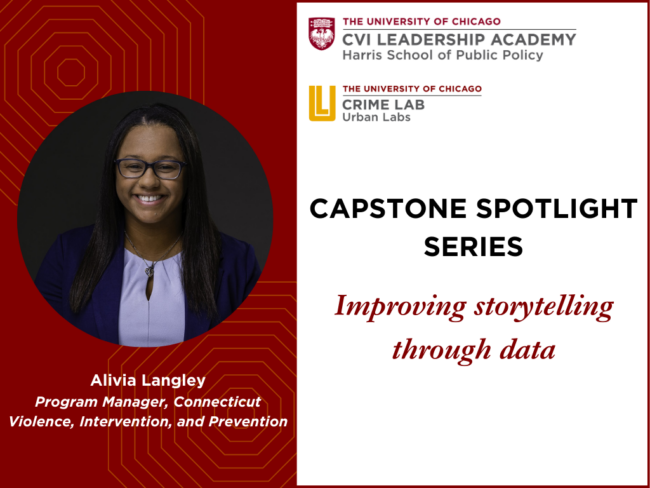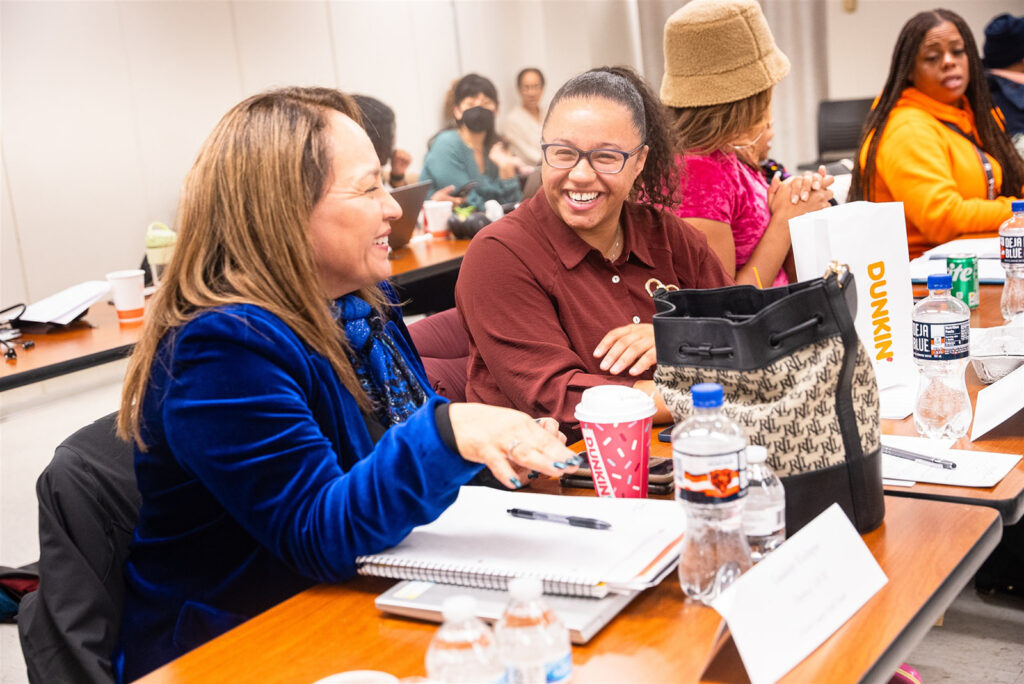Improving storytelling through data
Alivia Langley is the Program Manager for Connecticut Violence Intervention and Prevention and a graduate of the 2023 inaugural cohort of the University of Chicago Crime Lab’s Community Violence Intervention Leadership Academy (CVILA). Our Crime Lab team spoke with Alivia to learn how her experience in the CVILA has shaped her work.

This interview has been lightly edited for clarity and length.
Can you tell us more about your role and the organization that you work with?
I’m the program manager for Connecticut Violence, Intervention, and Prevention in New Haven, Connecticut. I oversee all the programs and supervise two program coordinators. We service two towns and ensure that they’re implementing the (violence prevention and intervention) services that they need. Our staff also work with the change makers and legislators in the towns to make sure that we’re effectively and appropriately providing beneficial services for our community.
How do you feel that the CVI Leadership Academy (CVILA) has prepared you to better do your role and lead at your organization?
The CVILA gave me a framework, background, and intelligence to really put what I already knew into effect. For example, going in, I had some idea about what a logic model was, but to really explore what that means in-depth was super helpful. One of my biggest takeaways was the discussion around mental health and learning how to show up for my community. Through those lessons, I was being challenged to decompress and to take care of myself.
What are some of those lessons about taking care of yourself and supporting your organizations sustainability that you’ve brought to your role after the CVILA?
The information that we learned around self-awareness, knowing when to take a break, and challenging my staff [to take breaks when necessary] empowers them to be more confident in their work.
What problem does your capstone project address?
My capstone project is addressing an organizational need to better tell our story through data. Providers and potential funders have been asking us to tell a success story. An improved central database enables us to see the bigger picture – like a visual of the ups and downs and how we’ve supported the process.
How did you decide what the focus of your capstone would be?
Before I started the cohort, I knew that a new database was a need for my agency. When I started the cohort, we were transitioning from a single program to a full agency.
At that time, our database didn’t have the bandwidth to keep up with the programs that we were implementing. We have some programs that aren’t even in our database, so I knew it was a dire need. We always hear, “no data, no dollars.” I knew how important an effective database was to be able to tell the story of our workers and the work that they’re doing and the community violence that we’re stopping. As I started going through the sessions and learning about how important data was and how we could use it to really change someone’s life, that sealed the deal for me.
Can you tell us a little more about how the capstone project has evolved since you’ve graduated?
It was kind of easy to put the capstone together because I was already taking a deeper dive into program needs and leveraging a database to support those needs seemed like a natural fit. We had several opportunities during the cohort to learn how to use data to make informed decisions and change program models.
I’m currently working with a consultant in Connecticut to support this process and figure out what metrics and equipment we need to track and what we want to track. I’m also working in collaboration with the City of New Haven to get a more robust system for emergency responses.
Can you share an example of how your capstone project has improved your organization’s operational practices?
Being able to build out a program model for each program was super helpful, even just going back to make sure that every program has a logic model – this was definitely something that we needed. When we first started, we didn’t have any program models, we were just doing the work, and the city knew that we were doing the work, and they called on us to build out the program to be able to say, “Here’s what we do, these are the metrics, and these are the outcomes we’ve hit on that have really made a difference.”
Can you share an example of how the changes that you’ve implemented are ultimately improving safety and saving lives within your community?
We are improving safety and saving lives by knowing [having a better understanding of] our clients and being able to support emergency [crisis] response activities. Ultimately this should lower the risk levels [factors] among our youth so that they aren’t committing crimes in our towns. The more we know about our clients, which is information that’s going to be held in our database, the better we can support them.
How would you describe the value of the academy to a peer who might be considering applying?
Anyone who has asked me about the cohort, I tell them to apply. It was a life changing experience for me. I’ve learned a tremendous amount from the cohort. You can’t put a price tag on the value.


